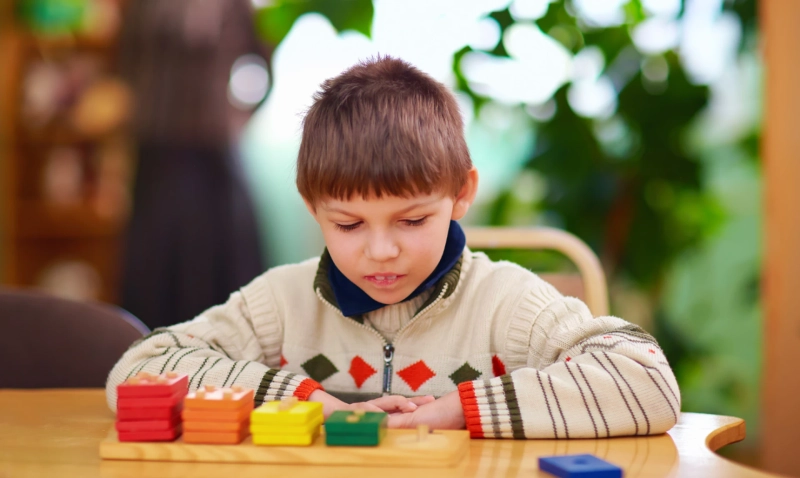Intellectual abilities and adaptive behavior are limited in cases of intellectual disability.
These limitations typically manifest during a child’s developmental period, before age 18, and significantly impact learning, reasoning, problem-solving, and social skills.
Every child develops uniquely, but certain signs may indicate a potential intellectual disability.
Symptoms of Intellectual Disability in Children
Parents and caregivers often wonder how to identify intellectual disability in children.
Observing the following signs may suggest a potential issue:
1: Delayed Development:
A child may not sit, crawl, walk, or talk at the expected age. Delays in motor skills or language development are often early indicators.
2: Learning Difficulties:
A key symptom is difficulty grasping basic concepts, following instructions, or retaining information. This may lead to challenges with academic tasks such as reading, writing, or math.
3: Communication Problems:
Children may exhibit delayed language development, limited vocabulary, difficulty forming sentences, or trouble understanding others. They may struggle to express thoughts or needs.
4: Behavioral Problems:
Children with intellectual disabilities may display tantrums, emotional outbursts, or difficulty controlling impulses, adapting to changes in routine, or adjusting to new environments.
5: Social Challenges:
Many children struggle to make friends, understand social cues, or participate in group activities. Some may have difficulty showing empathy or engaging in appropriate social behavior.
6: Difficulty with Problem-Solving:
Children may struggle with age-appropriate problem-solving, understanding consequences, or applying logic to everyday situations.
7: Delayed Self-Care Skills:
Challenges with practical skills such as dressing, feeding, or using the toilet may become apparent as the child grows older.
Professional evaluation like visiting child psychologist in patna is essential, as many symptoms may persist or worsen with age.
Types of Intellectual Disability in Children
Children with intellectual disabilities exhibit varying levels of severity, each impacting daily life differently.
Classifications are generally based on the degree of impairment and adaptive functioning:
Mild Intellectual Disability:
Children with mild intellectual disability experience minor learning difficulties. They may struggle with academic tasks but can often learn skills like reading, writing, and math with support. Socially, they function relatively well with minimal guidance.
Moderate Intellectual Disability:
Children with moderate intellectual disability show noticeable delays in speech, motor skills, and social behavior. They require special education programs and ongoing support to perform daily activities.
Severe Intellectual Disability:
Severe disabilities significantly impair communication and motor skills. Children may communicate using gestures or single words and require extensive support and supervision for daily tasks and personal care.
Profound Intellectual Disability:
Children with profound intellectual disability face significant challenges with cognition and mobility. They require constant supervision, care, and therapy to complete basic tasks like eating or dressing.
Common Causes of Intellectual Disability in Children
Understanding the causes of intellectual disability helps in planning effective care and treatment.
Common causes include:
Genetic Conditions:
Conditions like Down syndrome or Fragile X syndrome, along with other chromosomal abnormalities, can lead to intellectual disability.
Prenatal Factors:
Exposure to infections, alcohol, drugs, or toxins during pregnancy can damage the developing brain, increasing the risk of intellectual disability.
Birth Injuries:
Premature birth, low birth weight, or birth asphyxia may contribute to developmental delays.
Medical Conditions:
Severe infections, brain injuries, malnutrition, or untreated diseases can hinder brain development.
Environmental Influences:
Lack of stimulation, neglect, abuse, or exposure to toxins like lead can impair mental development.
Identifying the cause helps tailor interventions to meet the child’s unique needs.
When to Seek Professional Evaluation
Parents should act promptly if they notice signs of developmental delays and seek professional assessments.
Consult the following professionals:
Pediatrician:
Pediatricians conduct initial screenings, rule out medical conditions, and recommend further evaluations if needed.
Child Psychologist or Psychiatrist:
These specialists perform diagnostic assessments and suggest treatment options for intellectual disabilities.
Speech and Occupational Therapists:
They evaluate communication, motor skills, and overall development, providing tailored therapy sessions.
Special Education Experts:
Experienced educators can recommend appropriate instructional methods and classroom accommodations.
Early diagnosis and intervention significantly enhance a child’s learning potential and quality of life.
How to Help a Child with Intellectual Disability?
Supporting a child with an intellectual disability requires patience, consistency, and a nurturing environment.
Here are effective ways to help your child thrive:
Create a Structured Environment:
Establish a predictable routine to reduce anxiety and support learning. Consistency fosters security and stability.
Support Skill Development:
Focus on teaching self-care, social, and communication skills using step-by-step instructions, visual aids, and hands-on practice.
Use Clear Instructions:
Break tasks into small, manageable steps. Use simple language, visual supports, and frequent practice to reinforce learning.
Celebrate Achievements:
Acknowledge and celebrate even small successes. Positive reinforcement builds confidence and encourages growth.
Provide Emotional Support:
Offer patience, understanding, and reassurance during challenging moments. A supportive environment nurtures emotional well-being.
Engage in Therapy:
Behavioral, speech, and occupational therapies can address specific challenges and promote skill development across home and school settings.
Collaborate with Educators:
Work with teachers and special education staff to develop an Individualized Education Program (IEP) with tailored learning goals and support services.
Conclusion
Early recognition of intellectual disability signs enables timely intervention and improves developmental outcomes.
By understanding symptoms, causes, and support strategies, parents and caregivers can create a nurturing environment for their child.
Seeking professional help like consulting child psychiatrist in patna bihar, promoting independence, and celebrating achievements empower children to thrive.
If you suspect your child may have an intellectual disability, consult a healthcare professional for an assessment.
Early intervention makes a significant difference.



